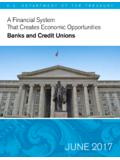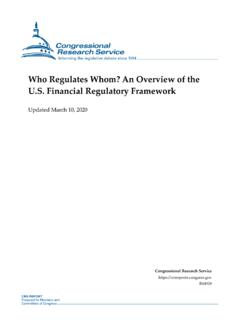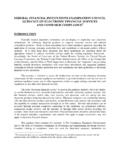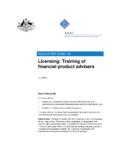Transcription of Financial Services Future Regulatory Framework Review
1 Financial Services Future Regulatory Framework Review : Proposals for Reform November 2021 CP 548 Financial Services Future Regulatory Framework Review : Proposals for Reform November 2021 CP 548 Presented to Parliament by the Economic Secretary to the Treasury by Command of Her Majesty Crown copyright 2021 This publication is licensed under the terms of the Open Government Licence except where otherwise stated. To view th is licence, visit Where we have identified any third party copyright information you will need to obtain permission from the copyright holders concerned. This publication is available at Any enquiries regarding this publication should be sent to us at ISBN 978-1-5286-2990-4 E02690955 11/21 Printed on paper containing 75% recycled fibre content minimum Printed in the UK by HH Associates Ltd. on behalf of the Controller of Her Majesty s Stationery OfficeStationery Office 1 Contents Foreword 2 Executive summary 4 Chapter 1 Introduction 10 Chapter 2 Consultation response overview 23 Chapter 3 Objectives and principles 30 Chapter 4 Relationship with HM Treasury 37 Chapter 5 Accountability to Parliament 44 Chapter 6 Stakeholder engagement and the policymaking process 48 Chapter 7 A comprehensive FSMA model 57 Chapter 8 Responding to this consultation and next steps 68 2 Foreword Financial Services is one of the UK s most vibrant, innovative and important industries.
2 As Economic Secretary, my role is to deliver on the government s vision for an open, green, and technologically advanced Financial Services sector. A sector that is globally competitive and acts in the interests of communities and citizens, creating jobs, supporting businesses and powering growth across the UK. The UK s leadership and innovation in Financial Services goes back over 400 years: the first paper banknotes, the first regulated stock exchange, and even the first ATM. And following the global Financial crisis in 2008, the UK was instrumental in driving the reforms to improve the global Financial system and has demonstrated an ongoing commitment to high Regulatory standards. Taking advantage of the UK s new freedoms now we have left the EU, the government wants to build upon our historic strengths to renew the UK s position as the world s pre-eminent Financial centre. The Future Regulatory Framework (FRF) Review will therefore play a critical role in delivering the vision for the sector set out by the Chancellor in his speech at Mansion House in July 2021.
3 The FRF Review provides a once-in-a-generation opportunity to ensure that, having left the EU, the government maintains a coherent, agile, and internationally-respected approach to Financial Services regulation that is right for the UK. The previous consultation on the FRF Review , issued in October 2020, received over 120 responses and has been the subject of significant engagement with stakeholders over the last 12 months. I am extremely grateful to everyone who engaged with the previous consultation, and would like to thank Parliamentary colleagues, market participants, consumer groups and other interested stakeholders for their enthusiastic response. This consultation builds on the previous one, sets out the government s proposals for important changes to the UK s Financial Services Regulatory Framework , and seeks to build on the strengths of the UK s existing model of regulation established by the Financial Services and Markets Act 2000 (FSMA). The proposals include changes to the regulators statutory objectives and enhanced mechanisms for accountability, scrutiny and oversight of the regulators by Parliament, HM Treasury and stakeholders.
4 It also sets out how we intend to return responsibility for designing and implementing Regulatory requirements to the UK regulators, a break from the approach under EU law. 3 This is an important moment for Financial Services regulation in the UK. I believe that these proposals will support our ambition to ensure that, at home and abroad, the UK s Financial Services sector is recognised as the most trusted and competitive in the world. I would urge all interested stakeholders to continue to share your views, and I look forward to further engagement on these important issues. John Glen MP Economic Secretary to the Treasury 4 Executive summary Overall approach 1. The Future Regulatory Framework (FRF) Review was established to determine how the Financial Services Regulatory Framework should adapt to the UK s new position outside of the European Union (EU), and how to ensure the Framework is fit for the Future . In particular, the FRF Review provides an important opportunity to ensure that the UK maintains a coherent, agile, and internationally-respected approach to Financial Services regulation that delivers appropriate protections and promotes Financial stability.
5 2. The current model of regulation was introduced by the Financial Services and Markets Act 2000 (FSMA). The FSMA model delegates the setting of Regulatory standards to expert, operationally-independent regulators, the Prudential Regulation Authority (PRA) and the Financial Conduct Authority (FCA), that work within an overall policy Framework set by government and Parliament. 3. The FSMA model was adapted to address the Regulatory failings that contributed to the 2007-08 global Financial crisis. The Financial Services Authority was split into the PRA and the FCA. The FCA was given the strategic objective to ensure that the relevant markets functions well. The PRA was given the general objective to promote the safety and soundness of PRA-authorised persons. In addition, there were reforms to the Bank of England, most notably the creation of the Financial Policy 4. The government believes that this model remains the most appropriate way to regulate Financial Services in the UK.
6 It ensures that the regulators real-world, day-to-day experience of supervising Financial Services firms is central to the Regulatory policymaking process. It also provides flexibility for the regulators to update standards efficiently in response to changing market conditions and emerging risks. Responses to the Future Regulatory Framework Review (FRF): Phase II Consultation2 published in October 2020 demonstrated that establishing a comprehensive model of regulation based on FSMA, with the appropriate enhancements, is overwhelmingly supported by stakeholders. Consultation respondents agreed with the government s view that the UK s FSMA model is world-leading and that no alternative model provided a preferable approach to Financial Services regulation. 1 These reforms were primarily delivered through the Financial Services Act 2012, Financial Services (Banking Reform) Act 2013, and Bank of England and Financial Services Act 2016. 2 Financial Services Future Regulatory Framework Review : Phase II Consultation, HM Treasury, 2021.
7 5 5. The UK s approach to regulation is internationally respected with the UK continuing to be a thought leader in the development of international standards for Financial Services . As observed by IMF studies,3 when independent regulators make judgements on the design of Regulatory standards, they are likely to deliver more predictable and stable Regulatory approaches over time. 6. As set out in the previous consultation published in October 2020, the PRA and the FCA remain the right institutions to deliver the UK s Financial Services Regulatory Framework . In addition, the government is not proposing to alter the macroprudential elements of the UK s Regulatory Framework , so the Financial Policy Committee is not within scope of the changes proposed in this Objectives and principles 7. In the strategy document published alongside the Chancellor s Mansion House speech in July 2021,5 the government affirmed that the UK will continue to promote high international standards.
8 Robust Regulatory standards are the cornerstone of the attractiveness of the UK s markets, and the stability and soundness of the UK s Financial system is an important priority for the government. 8. However, the FRF Review provides the opportunity to ensure that, having left the EU, the government establishes a coherent, agile and internationally-respected approach to Financial Services regulation that is right for the UK. 9. While the UK was a member of the EU, the government was able to ensure that matters of wider public policy, such as growth and international competitiveness, were considered as part of the negotiations to agree regulations at an EU level. As the regulators take on greater responsibility for setting detailed rules across a larger portion of the UK s Financial Services landscape, the government recognises the need to ensure that their objectives reflect the importance of the Financial Services sector as an engine of growth for the wider economy and the need to support the Future strength and viability of the UK as a global Financial centre.
9 10. The government therefore intends to provide for a greater focus on growth and competitiveness by introducing new, statutory secondary objectives for the PRA and the FCA. 11. The government also proposes to amend the existing Regulatory principles to ensure that sustainable growth should occur in a way that is consistent with the government s commitment to achieve a net zero economy by 2050. 3 Should Financial Sector Regulators be Independent?, Marc G Quinyn, 2004. Financial Regulators Need Independence, Udaibir S. Das, Marc Quintyn and Michael W. Taylor, 2002. 4 Actions taken by the regulators to implement directions and recommendations made by the FPC will therefore have specific carve-outs from both the overarching and activity-specific accountability mechanisms proposed here, as they are already subject to the FPC s existing Framework of objectives and accountability. 5 A new chapter for Financial Services , HM Treasury, July 2021. 6 Retained EU law 12. In the years since FSMA was introduced, and in particular following the global Financial crisis and the growth of the single market in the EU, EU Financial Services regulation has expanded into new areas, and become significantly more detailed, which has affected the operation of the FSMA model.
10 In particular, EU regulations complicated the split of responsibilities established by FSMA. They constrained the regulators ability to determine the most appropriate Regulatory requirements for UK markets, and required them to apply EU regulations and operate within the EU Framework . 13. The body of EU legislation that applied directly in the UK at the point of exit was transferred onto the UK statute book by the European Union (Withdrawal) Act 2018. This is known as retained EU law . 14. This approach to retained EU law has left the UK with detailed Regulatory requirements in primary and secondary legislation, which should under a FSMA approach primarily be in the regulators rules. The effect of having these Regulatory requirements in legislation is that it is difficult and time-consuming to update, and places substantial resource pressures on Parliament which is asked to consider a large volume of highly technical provisions. For example, the Markets in Financial Instruments Regulation sets percentage caps on how much trading volume can happen outside of a trading venue.
















